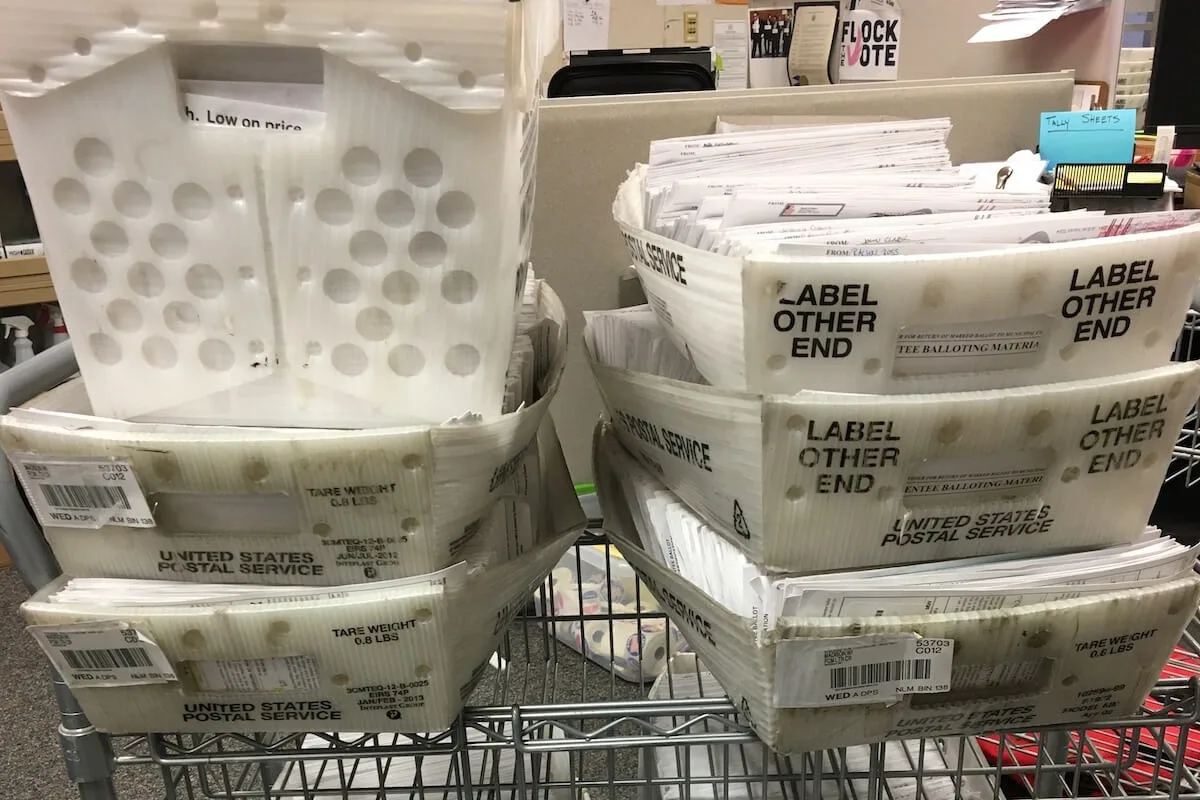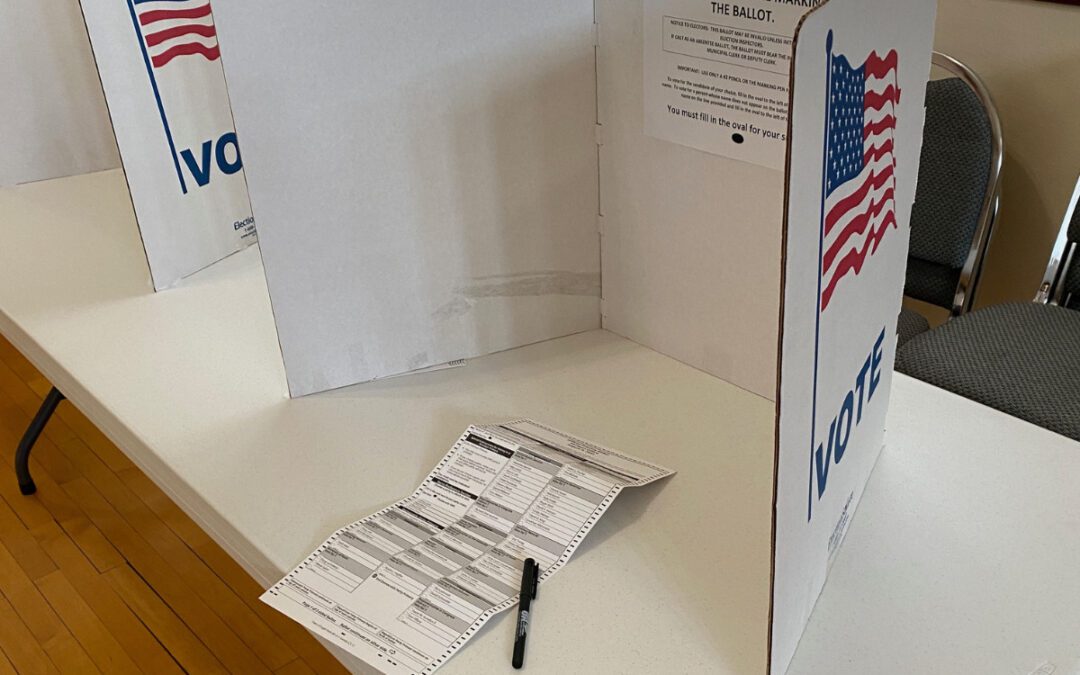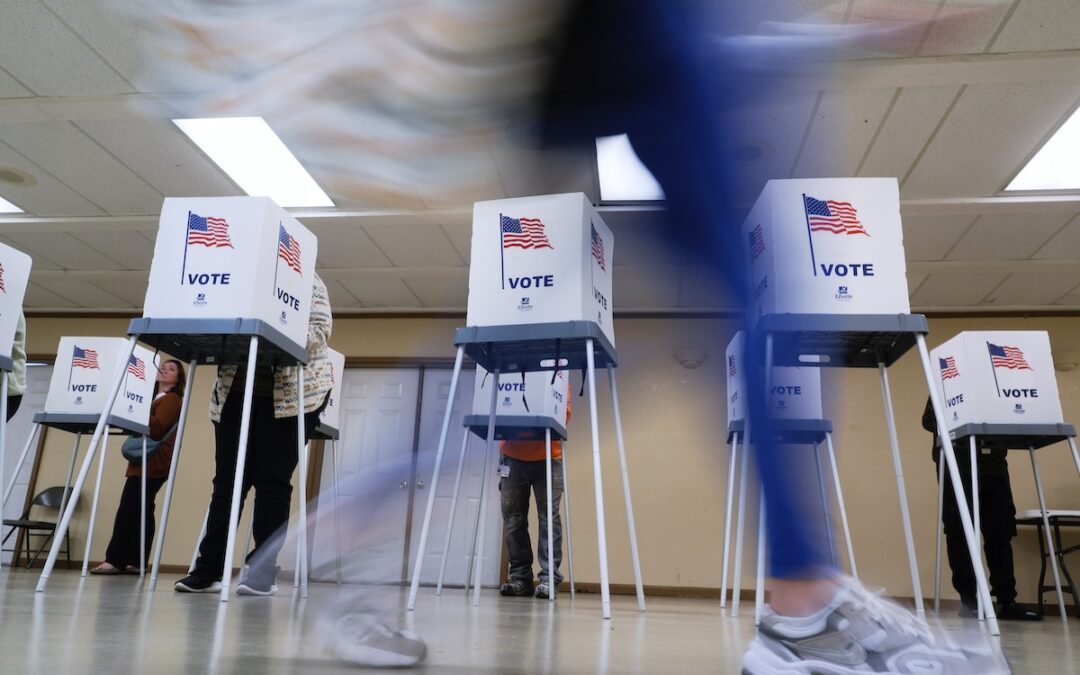
#image_title
Ballots postmarked through Election Day will be counted if they arrive by Nov. 9. Clerks urge voters not to wait.
[Editor’s Note: The 7th Circuit Court of Appeals later reversed itself and struck down the extension ordered by Judge Conley. This story pertains to a temporary order that was put in place until formal arguments could be heard.]
An appeals court on Tuesday issued a ruling giving Wisconsin voters more time to return their absentee ballots in the Nov. 3 presidential election, hours before President Donald Trump sharply criticized mail-in ballots during a chaotic debate with his Democratic presidential challenger, Joe Biden.
On the same day the three-judge 7th Circuit Court of Appeals in Chicago decided unanimously that election clerks can count absentee ballots received up to six days after the election—Nov. 9—as long as they are postmarked by Election Day, Trump once again railed against the reliability of absentee voting without evidence to back up his statements.
“As far as the ballots are concerned, it’s a disaster,” Trump told debate moderator Chris Wallace while offering no proof that mail-in balloting results in election fraud.
The president also falsely claimed that ballots are being dumped in rivers and creeks before making another unsubstantiated claim that postal workers are selling ballots.
Those comments represented the most recent of Trump’s attacks against absentee voting. He has spoken against that voting method since his election in 2016.
However, multiple studies say Trump’s assertions against absentee balloting aren’t backed by facts. While election experts say fraud in mail balloting is slightly more common than in-person voting, the amount is so tiny that it isn’t statistically relevant, those reports show.
For instance, Amber McReynolds, chief executive officer of the National Vote at Home Institute, and Charles Stewart, director of the MIT Election Data and Science Lab, said over the past 20 years, more than 250 million absentee ballots have been cast in the US, and there have been 143 related criminal convictions for election fraud, averaging out to a one case every six or seven years, and a fraud rate of just 0.00006%.
“Expanding voting by mail will be a challenge in most states in 2020,” they wrote. “But we reiterate: There is no evidence that mail-balloting results in rampant voter fraud, nor that election officials lack the knowledge about how to protect against abuses.”
Absentee voting is drawing increased attention this year as Americans are using that method to vote in record numbers because of concerns related to the coronavirus pandemic. In Wisconsin, more than 3 million residents are expected to vote in November, with about 2 million anticipated to vote by absentee ballot. Normally about 6% of voters cast ballots through absentee voting.
According to Wisconsin Elections Commission (WEC) figures, a record nearly 1.2 million voters have requested mail-in ballots for the presidential election after a record number did so for the April election because of the pandemic.
Last week, as a way to increase voter safety during the coronavirus outbreak and deal with projected high mail volume, U.S. District Judge William Conley ruled allowing absentee ballots to be counted as long as they were postmarked by the election date and received no more than six days later. Current law says absentee ballots must arrive at a clerk’s office or polling station by 8 p.m. on election day, meaning a ballot mailed on election day would arrive too late to be counted.
In its decision Tuesday, the 7th Circuit Court found that Republicans, who challenged Conely’s decision, lacked the authority to appeal his ruling.
Republicans could ask the appeals court to reconsider the matter, or they could appeal it to the U.S. Supreme Court, which is currently one justice short because of the recent death of longtime justice Ruth Bader Ginsburg. Republicans have not yet said whether they plan to appeal Tuesday’s ruling.
The case has national implications because Wisconsin is viewed as a key state in determining the outcome of the presidential election. Trump carried Wisconsin by fewer than 23,000 votes when he defeated Democrat Hillary Clinton or the presidency in 2016.
Even with the court’s decision extending the absentee ballots timeline, WEC Administrator Meagan Wolfe is urging voters to send in their ballots as soon as possible. She acknowledged some voters have questioned the integrity of absentee voting, and during a WEC meeting earlier this month, Republican commissioner Dean Knudson claimed casting a vote in person is the only way to ensure votes will count, because of concerns about the US Postal Service delivering ballot in a timely manner.
Those concerns were fueled by cases of the USPS delivering some absentee ballots late, or not at all, in Wisconsin during the spring election.
“I think it’s a much bigger risk than we’ve had in the past,” Knudson said of absentee ballots.
However, Wolfe has said absentee ballot voting in Wisconsin is safe. Earlier this month she presented the Wisconsin Elections Commission with a preparedness report for the Nov. 3 election, a plan to address challenges to the election that include a record number of absentee ballots. The WEC website provides a comprehensive list detailing absentee voting, including why it is safe and secure.
A statewide voter database is closely tracked by election clerks, with measures designed to prevent people from voting more than once. Absentee ballots are safely stored, and trained election officials closely oversee the counting of ballots.
Election clerks across Wisconsin reiterated that mall-in voting is safe from voter fraud. Even with a significant increase in absentee ballot numbers this year, they said voter database tracking allows them to protect voting integrity.
“We go through all of the same steps to verify voters, the same we do for voting in person,” Chippewa County Clerk Jaclyn Sadler said. “If someone tries to vote twice, it will show up that they have already voted. There are steps throughout the entire process to ensure that people aren’t voting twice.”
Eau Claire City Clerk Carrie Riepl said she feels secure enough in the safety of absentee voting that she votes that way herself. Instances of voter fraud occur but are infrequent, she said, and usually not on purpose. For example, she said, college students may vote absentee at home and then vote in person at their school, an unintentional mix-up on their part.
“We just don’t see many cases of it,” Reipl said of people voting more than once.
However, Sadler and Reipl said they’re fielding a growing number of people questioning the integrity of absentee voting. They attribute that to media reports of Trump and others questioning that method of casting ballots.
According to a WEC report, Wisconsin election clerks referred 19 cases of possible voter fraud, irregularities, or violations to district attorneys between February 2019 and August 2020. Those incidents occurred in Eau Claire, Racine, Milwaukee, Rock, Ozaukee, Wood, Brown, Kenosha and Waukesha counties.
Despite low potential voter fraud numbers in Wisconsin and elsewhere, Trump and other absentee voting opponents have referenced clerks disposing of absentee ballots they don’t want to be counted, but Sadler said that is highly unlikely to occur.
“None of us doing this work wants to do anything to draw attention to ourselves,” Sadler said. “The last thing we want is to be in the news the day after the election, to have the rest of the country looking at us for having done something wrong with this election.”

Citizen-driven ballot initiatives can’t happen in Wisconsin, but some people are trying to change that
About half the states have some process that allows citizens to collect enough signatures to force statewide referendums — something only the...

Trump: End mail-in voting. Wisconsin: No thanks
Democrats, Republicans, and Independents point to our state’s long history of secure elections that embrace absentee ballot use to make democracy...

Who is (and isn’t) running for Wisconsin governor in 2026?
Gov. Tony Evers’ retirement will set off a feeding frenzy of political ambition for the first open governor’s seat in 16 years, and the ripple...

New lawsuit seeks to redraw Wisconsin’s congressional maps before 2026 midterms
MADISON, Wis. (AP) — A new lawsuit seeking to redraw Wisconsin's congressional district boundary lines was filed on Tuesday, less than two weeks...




